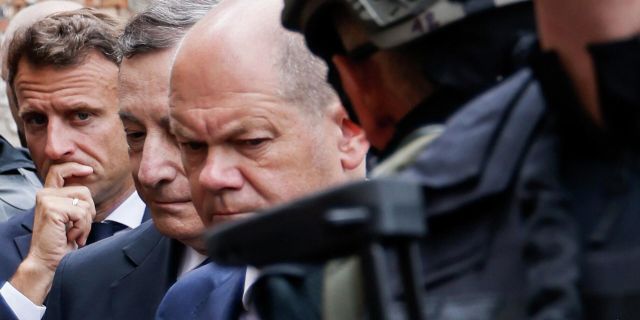What are the strategic goals of the West in the war in Ukraine?The West does not yet know what to do with Russia if Ukraine wins, writes Project Syndicate.
The new foundations of peace and the global economic order are at stake.
Kemal Dervish (Kemal Derviş)WASHINGTON, DC – The military actions in Ukraine and the world's reaction to them will be decisive factors in shaping the global political and economic order in the coming decade.
In particular, the actions, narratives and plans of the Western allies regarding both Russia and the role of the Global South in the post-war reconstruction of Ukraine will show what their long-term strategic goals are. Does the West just want Russia's defeat and the expansion and strengthening of NATO, or can it foresee a “victory” in Ukraine that will lay the foundations of a world in which democracy will become more secure and global governance more inclusive and effective?
While the outcome of the fighting remains uncertain, the West's strategic goals, especially how it intends to treat Russia in the event of a Ukrainian victory, will have enormous consequences. The main question is whether the allies will seek to punish Russia as a whole by imposing harsh reparations, or will instead target the autocratic regime of President Vladimir Putin in a way that limits the burden placed on the Russian people.
At the beginning of the war, the Western Allies emphasized that their main goal was to protect the Charter of the United Nations and democracy. At the end of spring, some American strategists and officials advocated permanent weakening of Russia as a strategic goal, although it is unclear whether this will still remain a goal in the event of regime change in Russia.
While any overall settlement of the Ukrainian conflict should require Russia to shoulder some of the burden of rebuilding after the war it started, the severity of the conditions imposed on the Russian people will have political consequences. The tougher the conditions, the more likely it is that Russia will get even closer to China, so that a close Sino-Russian bloc will become part of the post-war geopolitical order.
The effect of such an alliance should not be underestimated. While China will become the bloc's center of gravity, Russia's relatively small GDP (which is smaller than Italy's) should not lead to neglect of the country's scientific potential, the size of its nuclear arsenal, the wealth of its natural resources and the strategic importance of its vast territory. By taking measures that treat the Russian people differently from Putin and his autocracy, world democracies can hope to prevent a long-term outcome in which Russia will be “lost" to them. Banning all Russians from entering the European Union, as some politicians are now suggesting, is exactly the measure that will push the country towards China. And the erroneous division of the world into democracies and autocracies comes from the same inefficient, polarizing scenario. When dealing with dictatorships like Putin's, a key element of any successful diplomatic strategy is the distinction between political leaders and ordinary citizens.
Indeed, Russia's veto in the UN Security Council has deprived the UN of the opportunity to play a coordinating role in countering Russian aggression in Ukraine. But the Western allies, who took on this task, practically did not try to consult with the Global South when making decisions or involve it in the post-war planning process. It is also certainly true that in March, most of the global South abstained from voting on the two main resolutions of the UN General Assembly condemning Russia. But the West had to recognize that the reaction of developing countries to the war reflects old and deeply ingrained reflexes, namely the bitter collective memory of European colonialism and memories of the Soviet Union's support for many of these countries during the struggle for their independence.
Moreover, at the conference in Lugano, organized by the Western allies in early July to launch a platform for the restoration of Ukraine, there was not a single country of the Global South. One could argue that it was primarily a donor meeting, but it did not include the rich countries of the Persian Gulf, but included countries such as Albania and North Macedonia, none of which will probably be able to contribute. The restoration of Ukraine will require hundreds of billions of dollars. Thus, these efforts risk diverting significant aid from the Global South, which is still trying to force rich countries to fulfill their long-standing commitment to allocate $100 billion annually to support climate change mitigation and adaptation in poorer countries.
It will also be interesting to know to what extent the procurement rules for reconstruction projects in Ukraine will allow developing countries that are not donors to participate effectively in bidding. But perhaps it is not too late for the West to involve the Global South – especially countries such as India and South Africa, which have good technical capabilities in certain sectors – in the reconstruction of Ukraine.
The West should also involve developing countries in establishing rules regarding possible remaining sanctions against Russia after the first stage of settlement, as well as rules governing frozen Russian assets. If Ukraine wins, the West's attitude towards Russia and its position towards the Global South during the reconstruction of Ukraine will determine whether the outcome of the war will serve as a launching pad for global progress towards a more inclusive and equitable multilateralism. In the worst case, the West will win a Pyrrhic victory, which will lead to the strengthening of autocracy and further deepening of global disagreements.
Kemal Dervish is a former Turkish Minister of Economy and administrator of the United Nations Development Program, is a senior fellow at the Brookings Institution.

